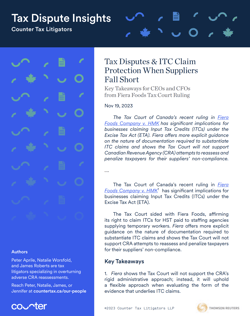
 The Tax Court of Canada’s recent ruling in Fiera Foods Company v. HMK1 has significant implications for businesses claiming Input Tax Credits (ITCs) under the Excise Tax Act (ETA).
The Tax Court of Canada’s recent ruling in Fiera Foods Company v. HMK1 has significant implications for businesses claiming Input Tax Credits (ITCs) under the Excise Tax Act (ETA).
The Tax Court sided with Fiera Foods, affirming its right to claim ITCs for HST paid to staffing agencies supplying temporary workers. Fiera offers more explicit guidance on the nature of documentation required to substantiate ITC claims and shows the Tax Court will not support CRA attempts to reassess and penalize taxpayers for their suppliers’ non-compliance.
Key Insights into Canada's ITC Claim Flexibility
- Fiera shows the Tax Court will not support the CRA’s rigid administrative approach; instead, it will uphold a flexible approach when evaluating the form of the evidence that underlies ITC claims.
- The ruling affirms that the law does not support the denial of ITCs based on a supplier’s failure to meet its tax remittance obligations.
- We anticipate the CRA will maintain its stringent stance on rejecting ITC claims. The CRA will likely continue its pattern of auditing, disallowing ITCs, and dismissing taxpayer objections on comparable grounds. Moving through these stages (while avoiding unforced errors) might be the best strategy.
- The CRA has revised its arguments and strategies post-Fiera to find a new way to win a different result in the Tax Court. Taxpayers need new strategies to counter the CRA’s revised approach. We hope future decisions will follow Justice Owen’s principled approach in Fiera.
The CRA’s approach in the Tax Court was to cast doubt on Fiera Foods’s integrity rather than concentrating solely on Fiera Foods’s evidence and legal responsibilities. Having cast this doubt, the CRA argued the Tax Court ought to support the CRA’s decision to deny the ITCs because the form and substance of Fiera Foods’s evidence fell short.
The Facts in Fiera Foods
Fiera Foods is a large industrial bakery. Fiera Foods wanted to lower the production and staffing costs. Fiera Foods believed that using temporary workers would achieve their cost-reduction goal. So, they used different staffing agencies to gain access to temporary workers. The staffing agencies supplied the workers and issued invoices to Fiera Foods. Fiera Foods paid the staffing agencies and claimed the ITCs.
_ElectricBlueGradient-Flat.jpg?width=4000&height=1771&name=CounterBlogPattern(2)_ElectricBlueGradient-Flat.jpg)
The CRA audited Fiera Foods’s tax returns. At the same time, the CRA reviewed the staffing agencies’ HST remittances. The CRA review found that the staffing agencies did not remit the HST. Also, the staffing agencies did not file payroll tax returns or operate at the locations listed on their invoices.
The CRA believed the staffing agencies engaged in a tax evasion scheme. The CRA could not recover their tax revenue from the staffing agencies. The CRA thought that Fiera Foods knew or suspected the staffing agencies were involved in a scheme. The CRA denied Fiera Foods’s ITCs on the HST that Fiera Foods paid to the staffing agencies.
CRA’s Stated Position & Moral Backdrop
The CRA’s official stance was that they denied the ITCs that Fiera Foods claimed because Fiera Foods’s evidence was insufficient in law to substantiate their claim for these ITCs. This rationale, though legally tenable, gives the CRA considerable discretion at the audit and objection stages and lacks transparency.
Taxpayers are not legally responsible to investigate or report others they suspect of tax non-compliance to the CRA. This applies to Fiera Foods’s situation; they had no legal duty to scrutinize or inform the CRA about the staffing agencies’ tax filings or practices. Fiera Foods’s knowledge is legally irrelevant. However, the CRA’s arguments emphasized and repeated the allegation that Fiera Foods knew the staffing agencies were involved in some tax scheme.
The CRA’s approach in the Tax Court was to cast doubt on Fiera Foods’s integrity rather than concentrating solely on Fiera Foods’s evidence and legal responsibilities. Having cast this doubt, the CRA argued the Tax Court ought to support the CRA’s decision to deny the ITCs because the form and substance of Fiera Foods’s evidence fell short. In particular, the CRA contended that Fiera Foods’s evidence did not meet the CRA’s internal standard.
The CRA’s approach in the Tax Court was to cast doubt on Fiera Foods’s integrity rather than concentrating solely on Fiera Foods’s evidence and legal responsibilities. Having cast this doubt, the CRA argued the Tax Court ought to support the CRA’s decision to deny the ITCs because the form and substance of Fiera Foods’s evidence fell short.
- Peter Aprile, Partner, Tax Litigation
Justice Owen’s Ruling: Upholding Flexibility and Simplicity in ITC Claims
Justice Owen held that Fiera Foods’s evidence made it clear that staffing agencies were the source of the workers. Justice Owen held that the CRA’s attempt to hold Fiera Foods accountable for the staffing agencies’ failures was wrong in law. Also, he held that the law did not support the standards the CRA created and used to evaluate Fiera Foods’s evidence and deny the ITCs.
Justice Owen’s paragraph 169(4)(a) analysis reinforces that the law does not require the information in the form the CRA imposed in this case. Paragraph 169(4)(a) does not “state or even imply that the evidence must take a form specified in the Regulations” and that it would be improper to read a requirement that does not appear in the legislation.2 Also, Justice Owen wrote that “the flexibility built into the wording of paragraph 169(4)(a) recognizes that the forms of information addressing transactions covered by the ETA vary greatly and may change and evolve over time”.3
Generally speaking, the law asks the ITC claimant to provide reliable information that shows the ITC amount. The law does not give the CRA the legal authority to create and apply unreasonably rigid evidentiary criteria (not grounded in legislation or case law) with the aims of (1) increasing tax collection or (2) penalizing taxpayers who, without any legal obligation, did not audit a supplier’s practices or report suspected non-compliance.
Parliament crafted and intended the CRA to administer it in a way that allows ITC claimants a simple process for recovering the HST incurred on their business inputs. The ITC claimants assume responsibility for providing reliable information, and the law creates a low standard concerning the format this information must take.
[T]he law asks the ITC claimant to provide reliable information that shows the ITC amount. The law does not give the CRA the legal authority to create and apply unreasonably rigid evidentiary criteria (not grounded in legislation or case law) with the aims of (1) increasing tax collection or (2) penalizing taxpayers who, without any legal obligation, did not audit a supplier’s practices or report suspected non‑compliance.
- Peter Aprile, Partner, Tax Litigation
Insights for ITC Disputes Post-Fiera
A Flexible Approach for Taxpayers
Fiera underscores a flexible approach towards ITC claims. This precedent rejects the CRA’s narrow interpretation of the law and rigid administrative approach. The law focuses on the nature and reliability of the information in ITC claims, not the form of evidence.
Expect Ongoing CRA Rigidity
Despite the Tax Court’s decision, we expect the CRA to take the same administrative approach. Like Fiera, the CRA’s ongoing process will likely include audits that set an excessively high standard and decisions at the objection stage that support this approach. We expect business leaders who minimize harm during the early tax dispute stages to position their companies for favourable outcomes later.
Adapt to the CRA’s Evolving Tactics
Since Fiera, the CRA has been modifying its tactics and arguments, exploring new ways to challenge ITC claims. A recent CRA tactic involves alleging the ITC claimant’s direct involvement in the supplier’s scheme. The CRA and DoJ hope this approach leads to a different outcome than Fiera.
We hope companies evolve their strategy and modify their behaviour to defeat the CRA’s new attempts to deny ITC claims. For example, in cases where there’s a considerable suspicion that suppliers might be involved in questionable activities like those seen in Fiera, it could be wise to consider ending these relationships. This action may diminish the effectiveness of the CRA’s allegations of the company’s involvement in fraudulent activities. It might also lead to a lower ITC dispute if the CRA audits and denies the ITCs claimed.
Since Fiera, the CRA has been modifying its tactics and arguments, exploring new ways to challenge ITC claims. A recent CRA tactic involves alleging the ITC claimant's direct involvement in the supplier's scheme. The CRA and DoJ hope this approach leads to a different outcome than Fiera.
We hope companies evolve their strategy and modify their behaviour to defeat the CRA's new attempts to deny ITC claims.
- Peter Aprile, Partner, Tax Litigation
The Same Legal Principles for Everyone
The CRA and its stakeholders frequently remind the tax community about the necessity of a principled approach to tax law. However, we do not recall any conversation about the CRA’s responsibility to maintain objectivity in tax audits, objections, and appeal decisions, safeguarding against the influence of personal biases and moral judgments. The CRA and DoJ are responsible for identifying bias and rooting moral judgments that might have shaped earlier stages of the process or could be impacting current decisions.
When the CRA or other stakeholders let personal emotions or moral principles sway or justify their decisions, it moves Canada further away from the tax culture and system we strive for. Ironically, such behaviour, whether deliberate or not, might result in more widespread non-compliance, the very issue the CRA seeks to prevent.
Admittedly, it is difficult to identify when the CRA diverges from strict legal principles. We imagine most CRA employees and stakeholders aim to prevent personal emotions or moral principles from influencing their decisions. Many likely intend to do the right thing, but it can be challenging to recognize when personal biases drive their actions and decisions.
We hope this reminder about the parties’ mutual responsibility encourages CRA employees and stakeholders to reflect on this responsibility and the broader implications when engaging with their work.
When the CRA or other stakeholders let personal emotions or moral principles sway or justify their decisions, it moves Canada further away from the tax culture and system we strive for. Ironically, such behaviour, whether deliberate or not, might result in more widespread non-compliance, the very issue the CRA seeks to prevent.
- Peter Aprile, Partner, Tax Litigation
Conclusion
Fiera marks a significant milestone in tax dispute resolutions. It represents a positive development for taxpayers but doesn’t offer blanket protection. We hope business leaders stay informed and adaptable, strategically navigating the tax landscape and protecting the economic value they create.
Citations
1 Fiera Foods Company v. The King, 2023 TCC 140.
2 Ibid at paragraphs 283 and 284.
3 Ibid at paragraph 289.

.jpg?width=120&name=Counter%20Tax%20Litigators%20Logo%20Stacked%20(MidnightBlue%20on%20White).jpg)

.png?width=499&height=299&name=CRA%20Disputes_Management_Board_First_Conversation%20(Sphere%201%20Purple).png)





.png?width=400&height=400&name=CT-How_Can_We_Help-22_july_NewGraphic_b(small).png)